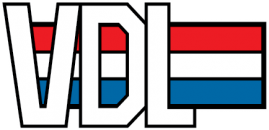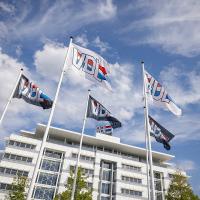First six months at VDL Groep: Stable turnover, results show recovery
The first six months of 2025 were in line with expectations for VDL Groep. Sales were similar to the previous year and earnings have recovered. Excluding the Car Assembly division, the first six months of 2025 saw growth in turnover. Despite an uncertain outlook due to geopolitical instability and cost pressures, turnover and earnings are expected to remain stable in the second half of the year.
After the first six months of 2025, the combined turnover was EUR 2 billion (first six months of 2024: EUR 2.1 billion). Excluding the Car Assembly division, sales rose 2.5 per cent. After the first two quarters of 2025, the net result is EUR 53 million. Last year, that number was EUR 3 million. The order book has declined since the start of the year, primarily due to delayed bus deliveries. The amount stood at EUR 1,727 million in week 35. Since the start of 2025, the number of employees has has remained unchanged since the beginning of 2025 and now stands at over 14,000 colleagues.
‘On the road to recovery’
Willem van der Leegte, President & CEO of VDL Groep, says: “A year ago, we were facing a combination of major challenges that had a direct impact on our results, such as developments at VDL Nedcar and delayed bus deliveries. Now that the organisations are in place, or are in the process of being put in place, the road to recovery has begun. However, developments relating to geopolitical instability and cost pressures are having a direct impact on our global competitive position, particularly for products and services that are less complex and/or difficult to automate.”
Subcontracting
Turnover for the Subcontracting division decreased from EUR 1,393 million in the middle of last year to EUR 1,303 million. This 6 per cent decline can be explained by stagnant market conditions primarily related to the semiconductor industry. The operating companies that are active in this division are well positioned in VDL’s growth markets (Hightech, Mobility, Energy, Infratech and Foodtech). The Subcontracting division is profitable.
Buses
Turnover for the Buses division rose sharply: from EUR 132 million last year to EUR 270 million. This increase can be explained by the fact that deliveries have improved significantly. The integration of VDL Van Hool into the Buses division is in full swing. This activity is facing uncertainties due to import duties from the US as well as the sharp decline in the value of the dollar against the euro. The Buses division is operating at a loss. In order to ensure the continuity of this division, the losses must be stopped. For this reason, all public transport activities will be concentrated at the public transport location in Roeselare (Belgium). As has always been the case in the past, the location in Valkenswaard will once again focus entirely on coaches (touring cars). Starting next year, the third generation of VDL Futura coaches will be produced there. The launch of this new coach will be a highlight at Busworld, the largest trade fair for the bus and coach industry in Europe, which will take place this year from October 4 to 9 in Brussels. The Futura 3 represents a major leap forward for customers in terms of lifespan costs for the vehicle, driven in particular by fuel savings of up to 15 per cent.
Finished products
The VDL companies that make up the Finished Products division jointly generated EUR 444 million in revenue over the first six months of 2025, compared to EUR 432 million in the same period in 2024. The companies in this division are well positioned across the board.
The Finished Products division is profitable.
At the end of the first half of the year, Eindhoven-based Crux Agribotics was acquired and renamed VDL Agrobotics. This acquisition is further strengthening VDL Groep’s position in food tech, one of the growth markets of VDL. The ‘smart robot’ from VDL Agrobotics uses data and AI (artificial intelligence) to classify, sort and pack fruit and vegetables. This is making a significant contribution to the automation of global fruit and vegetable horticulture. Robotisation is helping growers save on labour costs and reduce food waste. The data generated is also analysed to further optimise the cultivation process.
VDL in Born
In consultation with the province of Limburg and other (local) authorities, the various divisions of VDL Groep in Born, VDL Nedcar, VDL Special Vehicles, VDL Mobility Innovation Centre, and VDL Defentec, are working on the further development of the site in line with four strategic development directions: sustainable mobility, battery packs and new energy systems, high-tech manufacturing and the defence industry. These operations currently employ about 250 people. The ambition is to transform the VDL site in Born into a sustainable, autonomous production location for the national and European high-quality manufacturing industry, generating a positive impact on employment and the economy.
Before the summer holidays, the Ministry of Defence signed an initial agreement with VDL Groep to rent production space in Born. As a tenant, the Ministry of Defence can directly accommodate projects at the Born location. This is an important step towards scaling up national production capacity for the Dutch and European defence industries. The government has called on VDL Groep to leverage its expertise in this area. Given the geopolitical situation, the family-owned industrial business recognises the urgency of taking on this responsibility. In doing so, VDL is committed to meeting the needs of the Dutch defence sector.
Prospects
Despite an uncertain outlook due to geopolitical instability and cost pressures, turnover and earnings are expected to remain stable in the second half of the year. VDL Groep is calling on politicians, also after next month's general election, to implement a stable, long-term industrial policy and work towards creating a favourable business climate. This will help strengthen the Netherlands' and Europe's competitive position in comparison to the rest of the world. After all, a positive business environment is the foundation of widespread prosperity.

